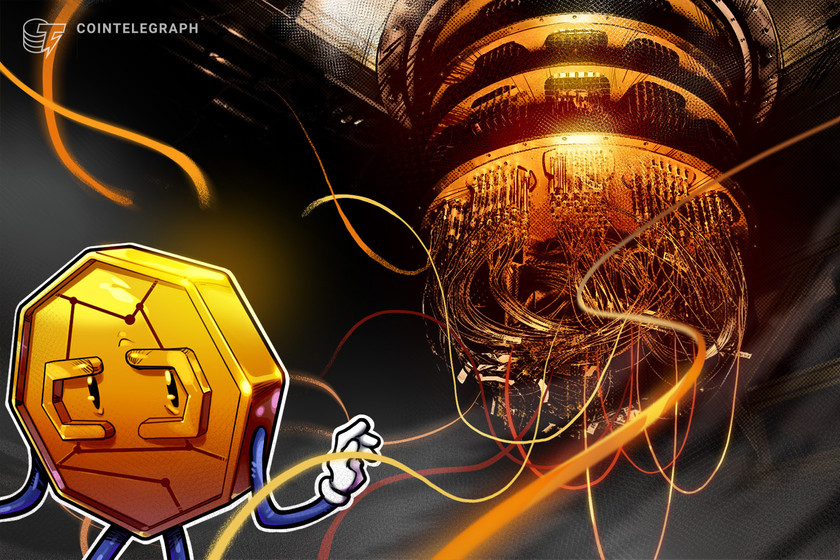
Quantum computing still has a long way to go before posing a threat to blockchain technology.
Quantum computing has raised concerns about the future of cryptocurrency and blockchain technology in recent years. For example, it is commonly assumed that very sophisticated quantum computers will one day be able to crack present-day encryption, making security a serious concern for users in the blockchain space.
The SHA-256 cryptographic protocol used for Bitcoin network security is currently unbreakable by today’s computers. However, experts anticipate that within a decade, quantum computing will be able to break existing encryption protocols.
In regard to whether holders should be worried about quantum computers being a threat to cryptocurrency, Johann Polecsak, chief technology officer of QAN Platform, a layer-1 blockchain platform, told Cointelegraph:
“Definitely. Elliptic curve signatures — which are powering all major blockchains today and which are proven to be vulnerable against QC attacks — will break, which is the ONLY authentication mechanism in the system. Once it breaks, it will be literally impossible to differentiate a legitimate wallet owner and a hacker who forged a signature of one.”
If the current cryptographic hash algorithms ever get cracked, that leaves hundreds of billions worth of digital assets vulnerable to theft from malicious actors. However, despite these concerns, quantum computing still has a long way to go before becoming a viable threat to blockchain technology.
What is quantum computing?
Contemporary computers process information and carry out computations using “bits.” Unfortunately, these bits cannot exist simultaneously in two locations and two distinct states.
Instead, traditional computer bits may either have the value 0 or 1. A good analogy is of a light switch being turned on or off. Therefore, if there are a pair of bits, for example, those bits can only hold one of the four potential combinations at any moment: 0-0, 0-1, 1-0 or 1-1.
From a more pragmatic point of view, the implication of this is that it is likely to take an average computer quite some time to complete complicated computations, namely those that need to take into account each and every potential configuration.
Quantum computers do not operate under the same constraints as traditional computers. Instead, they employ something that is termed quantum bits or “qubits” rather than traditional bits. These qubits can coexist in the states of 0 and 1 at the same time.
As mentioned earlier, two bits may only simultaneously hold one of four possible combinations. However, a single pair of qubits is capable of storing all four at the same time. And the number of possible options grows exponentially with each additional qubit.
Recent: What the Ethereum Merge means for the blockchain’s layer-2 solutions
As a consequence, quantum computers can carry out many computations while simultaneously considering several different configurations. For example, consider the 54-qubit Sycamore processor that Google developed. It was able to complete a computation in 200 seconds that would have taken the most powerful supercomputer in the world 10,000 years to complete.
In simple terms, quantum computers are much faster than traditional computers since they use qubits to perform multiple calculations simultaneously. In addition, since qubits can have a value of 0, 1 or both, they are much more efficient than the binary bits system used by current computers.
Different types of quantum computing attacks
So-called storage attacks involve a malicious party attempting to steal cash by focusing on susceptible blockchain addresses, such as those where the wallet’s public key is visible on a public ledger.
Four million Bitcoin (BTC), or 25% of all BTC, are vulnerable to an attack by a quantum computer due to owners using un-hashed public keys or re-using BTC addresses. The quantum computer would have to be powerful enough to decipher the private key from the un-hashed public address. If the private key is successfully deciphered, the malicious actor can steal a user’s funds straight from their wallets.
However, experts anticipate that the computing power required to carry out these attacks would be millions of times more than the current quantum computers, which have less than 100 qubits. Nevertheless, researchers in the field of quantum computing have hypothesized that the number of qubits in use might reach 10 million during the next ten years.
In order to protect themselves against these attacks, crypto users need to avoid re-using addresses or moving their funds into addresses where the public key has not been published. This sounds good in theory, but it can prove to be too tedious for everyday users.
Someone with access to a powerful quantum computer might attempt to steal money from a blockchain transaction in transit by launching a transit attack. Because it applies to all transactions, the scope of this attack is far broader. However, carrying it out is more challenging because the attacker must complete it before the miners can execute the transaction.
Under most circumstances, an attacker has no more than a few minutes due to the confirmation time on networks like Bitcoin and Ethereum. Hackers also need billions of qubits to carry out such an attack, making the risk of a transit attack much lower than a storage attack. Nonetheless, it is still something that users should take into mind.
Protecting against assaults while in transit is not an easy task. To do this, it is necessary to switch the underlying cryptographic signature algorithm of the blockchain to one that is resistant to a quantum attack.
Measures to protect against quantum computing
There is still a significant amount of work to be done with quantum computing before it can be considered a credible threat to blockchain technology.
In addition, blockchain technology will most likely evolve to tackle the issue of quantum security by the time quantum computers are widely available. There are already cryptocurrencies like IOTA that use directed acyclic graph (DAG) technology that is considered quantum resistant. In contrast to the blocks that make up a blockchain, directed acyclic graphs are made up of nodes and connections between them. Thus, the records of crypto transactions take the form of nodes. Then, the records of these exchanges are stacked one on top of the other.
Block lattice is another DAG-based technology that is quantum resistant. Blockchain networks like QAN Platform use the technology to enable developers to build quantum-resistant smart contracts, decentralized applications and digital assets. Lattice cryptography is resistant to quantum computers because it is based on a problem that a quantum computer might not be able to solve easily. The name given to this problem is the Shortest Vector Problem (SVP). Mathematically, the SVP is a question about finding the shortest vector in a high-dimensional lattice.
Recent: ETH Merge will change the way enterprises view Ethereum for business
It is thought that the SVP is difficult for quantum computers to solve due to the nature of quantum computing. Only when the states of the qubits are fully aligned can the superposition principle be used by a quantum computer. The quantum computer can use the superposition principle when the states of the qubits are perfectly aligned. Still, it must resort to more conventional methods of computation when the states are not. As a result, a quantum computer is very unlikely to succeed in solving the SVP. That’s why lattice-based encryption is secure against quantum computers.
Even traditional organizations have taken steps toward quantum security. JPMorgan and Toshiba have teamed up to develop quantum key distribution (QKD), a solution they claim to be quantum-resistant. With the use of quantum physics and cryptography, QKD makes it possible for two parties to trade confidential data while simultaneously being able to identify and foil any effort by a third party to eavesdrop on the transaction. The concept is being looked at as a potentially useful security mechanism against hypothetical blockchain attacks that quantum computers might carry out in the future.




















































































